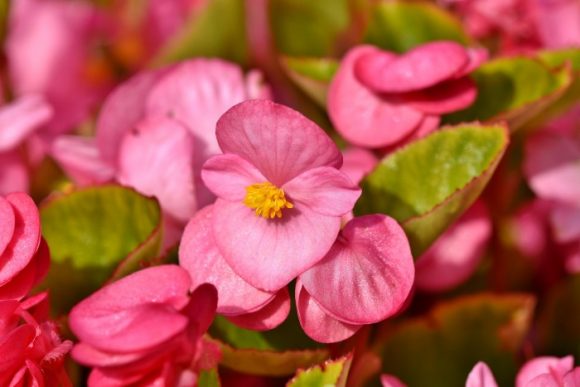- The Miraculous Shiny Bush Plant - January 18, 2021
- Colorful, Edible and Medicinal Celosia - January 10, 2021
- Radish, a Nutritional Power House - December 19, 2020
Begonia coccinea, or angel wing begonia, commonly known as begonia, is a fibrous, herbaceous, flowering, perennial plant with erect, branched stems. The plant starts flowering from summer and lasts until winter, bringing forth light pink or red flowers with a mild fragrance. The flowers are irregularly shaped blossoms with red peduncles. Begonias occur naturally in tropical and subtropical climates. These plants are quite popular due to their beautiful flowers with some species thriving indoors as ornamental plants. Begonia blossoms are likened to roses in beauty and luxury. They are rich in color, warm, and feminine.
[Note: The Right Flowers is not a medical site. Knowledge of and information about the therapeutic benefits and applications of flowers, while known through the ages, does not constitute medical advice. If you are having health issues, you should consult with a physician.]
Basically, all plants in the begonia genus (about 1,500 species) not only have beautiful flowers but also have culinary and medicinal purposes. The flowers can be eaten raw as snacks and have a citrus-like flavor. They can also be added to soups, salads, and sandwiches. In addition, the Journal of Economic Botany holds that begonias were a popular preventative agent for vitamin C deficiency in the 1940s when scurvy was a major health problem.
Though begonia does not have the punch packed by citrus fruits when it comes to essential vitamins and minerals, people in dire need of these vital nutrients can nibble on these flowers to alleviate acute deficiency symptoms.
Apart from alleviating lack of vitamin C, begonia is known to have sufficient levels of medicinal qualities that make it ideal for treating and relieving coughs and fever. The flowers are also laxative, emetic and cathartic.
Antioxidant
Begonias are known to have antioxidant properties. They are used to reduce inflammation, clean wounds and to treat many other ailments.
Anti-tumor
Begonia flowers have anti-tumor compounds. Herbalists in the West Indies have used them for generations to fight against cancer. A 2009 study, published in the Journal of Ethnopharmacology, stipulates that begonias have cytotoxicity effects in cancer cells.
Treats bronchitis, rheumatism, and gout
Bronchitis is a condition caused by bronchial problems causing obstruction of oxygen to the lungs. Since begonias have anti-inflammatory properties, they are considered ideal for treating bronchitis. In addition, the anti-inflammatory properties in begonias make them an ideal remedy for rheumatism and gout.
Colds and flu
Begonias contain anti-bacterial and anti-viral compounds. In addition, high levels of vitamin C in these flowers make them good for treating colds and flu.
Ultimately, though begonia flowers are highly popular for their ornamental value, they bring much more to the table than beauty. These flowers have medicinal value and they are yummy too. Since finding flowers with these three qualities is hard, why not place your order for begonias now and have them in your backyard before winter comes knocking?





